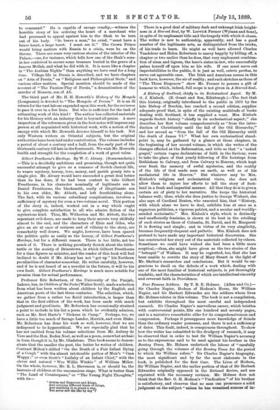Professor Eric Robertson, of the University of the Punjab, Lahore,
has, in Children of the Poets (Walter Scott), made a selection from what has been written about children by the English and American poets of the last three centuries. The selection, which, we gather from a rather too florid introduction, is larger than that in the first edition of the work, has been made with much judgment and good taste. Mr. Robertson has occasionally strained a point to include in his list a poem which he evidently admires, such as Mr. Bret Harte's "Dickens in Camp." Perhaps, too, we have a little too much of Savage Landor, Herrick, and even Blake. Mr. Robertson has done his work so well, however, that we are indisposed to be hypercritical. We are especially glad that he has not omitted from his volume selections from Mr. Aubrey de Vere and the Hon. Roden Noel, as well as a poem, somewhat archaic in form though it is, by Mr. Gladstone. This book seems to demon- strate that the smaller the poet, the better he writes of children. Contrast Milton's stilted "On the Death of a Fair Infant Dying of a Cough" with the almost intolerable pathos of Moir's "Cam Wappy ;" or even Scott's "Lullaby of an Infant Chief," with the clever and natural "Wee Willie Winkle" of William Miller. On the whole, however, Mr. R. L. Stevenson is, or should be, the laureate of children at the unconscious stage. What is better than "The Land of Counterpane," or "The Young Night Thoughts," with its-
" Armies and Emperors and Kings, And carrying different kinds of things, And marching in so grand a way, Ion never saw the like by day"?
There is a good deal of military dash and unkempt Irish bright- ness in A Starved Soul, by W. Lerwick Fermor (Wyman and Sons),. in spite of its unpleasant title and the tragedy with which it closes. The writer is new to authorship, apparently, and has a good number of the legitimate arts, as distinguished from the tricks, of his trade to learn. He might as well have allowed Charles Vandeleur and Helen Robertson to marry happily by killing off, a. chapter or two earlier than he does, that very unpleasant combina- tion of siren and tigress, the hero's sister-in-law, who successfully palms herself off upon him as his wife. If one must serve out improbabilities to the public, it is just as well, cceteris paribus, to serve out agreeable ones. The Irish and American scenes in this book have, however, the air of reality; and such sketches as those of "The Three Disgraces" show Mr. Fermor to possess a gift of humour to which, indeed, full scope is not given in A Starved Soul.


































 Previous page
Previous page